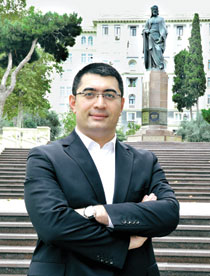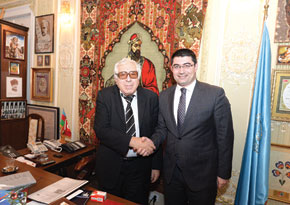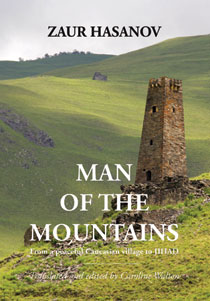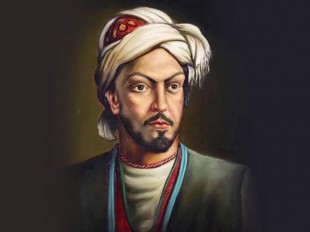Man of the Mountains, a prize-winning novel by Azerbaijani author Zaur Hasanov, hits the bookshops this autumn. Translated from Russian by Caroline Walton, Man of the Mountains won first place in the competition for best original work at the Open Central Asia Book Forum and Literature Festival 2013. The prize? Publication in English by UK-based Silk Road Media.
To find out more about the book and its author, Visions’ Anne Thompson-Ahmadova went to meet Zaur Hasanov at his ‘day job’, working on the Trans-Eurasian Information Super Highway for Azerbaijan’s Ministry of Communications and High Technologies. But more of the TASIM project later.
I started off by asking what Man of the Mountains is about.
Basically, it’s the story of the Caucasus. You know that the Caucasus has had a very turbulent history, particularly in recent years. I’ve travelled extensively in south and north Caucasus. I went for example to the Pankisi Gorge [a valley in Georgia, close to the border with Chechnya, inhabited mainly by ethnic Chechens known as Kists and refugees from Chechnya itself – Ed.] I met with Chechen rebels there so I travelled to the northern Caucasus. I met Chechen rebels pretty much everywhere, even in Afghanistan, so it was a very interesting subject for me from the very beginning. I still don’t know why I’m interested in it, but I think it’s partly because I grew up in the north of Azerbaijan, where there is this cult of highlanders which is very much alive – maybe because of that.
I know that some youngsters, some young men around 18-20-25 years of age, used to travel to Chechnya in those days, during the Chechen wars. And it also struck me: why should Azerbaijanis go and fight for Chechens in Chechnya? So altogether it was always in my mind.
FOR WESTERN READERS
Despite the subject matter, neither Azerbaijanis nor Chechens were Zaur’s intended readership for Man of the Mountains.
I was trying to put something in a very easy form for foreigners. The book from the very beginning was for foreigners, to inform the Western audience about the Caucasus, so they could read it and there would be no questions left, so they would understand the mindset of these people, their values, why they act in this or another way, their different circumstances.
When I was studying in the United States, there was pretty much no book on the Caucasus by a Caucasian, even though there are good books about the Caucasus – for example, I love Azerbaijan Diary written by Thomas Goltz, it’s my favourite book; even today I am reading Georgia Diary, as it’s a fascinating book. Lermontov’s writing is great; he’s a great poet who understood the Caucasian mindset maybe much better than many Caucasians. But this time I wanted some Caucasian to write a book, so it was very challenging for me, an important mission, even though it has no impact on my career, on my daily life. I didn’t expect it would bring me any money. But still, why leave our story to Thomas Goltz, Thomas de Waal? Why can they write but we cannot? What is the big deal?
There were all these puzzles in my head, so I said to myself that I want to write. It was not the first creative stuff I had done in my life – again in my TV years I also asked myself, why don’t we know anything about the first Azerbaijani oilmen? This was between 1860 and 1970. With this in my mind, I went and shot a 100-minute documentary for ANS TV channel on the history of oil and the oilmen of Azerbaijan, how society was different back then. It was for internal consumption. I think that I succeeded because every year ANS TV shows this film; eight years, nine years in a row, I believe. So I said to myself, if I can have small success for Azerbaijan, why not do something creative for Westerners, especially since there is no information about Azerbaijan written by Caucasians. I thought it would not be difficult for me, but – (laughs) – then when I started to write it was very difficult, very challenging, but I did not want to give up.
MYSTICAL RESISTANCE
When Zaur was a journalist with Azerbaijani TV station ANS in the late 1990s and early 2000s, he made frequent reports from Chechnya and elsewhere.
Going back to my years when I travelled in the Caucasus, I had a lot of information on this war, specifically on the war in Chechnya. I saw how people, the Chechens, even though they were a small part of Russia, how they come together in times of difficulties, and I was interested why people with no training, not having this very mature society based on European style, managed to come together and put up very solid resistance. They were very successful in this resistance for years. It seems to me very mystical. Even though I am Caucasian there was something very mystical in this story for me; that’s why it also grabbed my attention and I started to take more interest, to meet Chechens here, and in the northern Caucasus and Europe and grab more and more information about it. And I found very interesting facts, which I thought that I could put in the book. So that was the very beginning – the reason why.
I wondered what language he had written the book in.
It was in Russian, but I never enjoyed it in Russian, to be honest. When I started to truly enjoy it was when I found Caroline. I don’t know why but I always thought that the language it should be written in is English. I started to write in English, then I thought it was difficult, so I started to write in Russian. Then I got in touch with Caroline Walton – she’s a writer and interpreter and translator in the UK – and she gave new breath to the book. When I was looking for a translator, I tried to pick a good one. I sent all of them standard questions – this is what the book is about, so why do you want to translate it etc. I didn’t get the response I wanted. Then Caroline sent me one sentence which I truly loved. She said it was the story of a young Caucasian boy who has problems, burdens, challenges, but he doesn’t give up his principles. And I said that’s what the book is about, but even as the author I never put it so well in one sentence. I loved it, so I said, “Caroline, I definitely want to work with you,” and I think that she’s a great translator for this book.
Of course, my perception of the Caucasus is of a quite mystical place; again, why? Because small nations, with no training, military training, with no weapons, etc., they go and fight and defeat the big powers. That was very mystical, because it doesn’t fit logic, if you look in the Western world.
NIZAMI
The mysticism in the story is not limited to the Chechens’ resistance to a much greater power. Man of the Mountains is in part homage to one of Azerbaijan’s greatest poets, Nizami, who lived in 12th century Ganja.
I was also fascinated with Nizami Ganjavi, because his historic Alexander the Great, or Isgandarnameh, is a very mystical story. It’s not the standard book that I’ve read about Alexander the Great. There is more philosophy there, more values there. And what’s even more interesting is that the events take place in regions that are still hot points in terms of news. For example, Alexander goes and fights in Iraq, which is in bad shape now. He even goes to Abkhazia to help Abkhaz to fight against Russians. You know, it’s so interesting! He goes to Afghanistani Peshawar and he starts the idea about which culture is better, Asian culture, Byzantine culture, because there is a clash of civilizations, so it was very mystical and very relevant to today.
So I thought, why is it not translated into English in the first place? That was a big question for me. It should be translated; it’s such a good story. Unfortunately, in the best case Azerbaijanis know when Nizami was born and when he died, that he wrote Five Poems – the Khamsa, etc., but it doesn’t go beyond that. We don’t promote it. From my perspective, it’s a very serious insult to his legacy, to his soul. I decided to put it in a book, because it’s very relevant to what is happening in the world.
The story goes that a young man starts to fight with Islamic radicals and with Russians invading the country; he fights with both of them, suffers personal loss, then he starts to read Nizami. That’s how he tries to find the challenging solution for his battle to survive.
FIGHTING RADICALISM
Man of the Mountains is brimming with themes relevant today.
Another reason I think it’s important, a serious issue for the government: the book talks about the strategy of Islamic radicals, how they recruit people. It explores their technologies or tools to recruit. It’s a big issue and getting bigger and bigger, but pretty much we don’t talk about it. I saw how people come and recruit young men and pretty much destroy their lives.
In the Western world they see people with beards, radicals, they think that everyone in the Caucasus is like this; it’s a stereotype, it’s media framing. What’s happening right now is that the vast majority of people in the Caucasus are against those radicals, they don’t accept them, but, despite that, they’re getting stronger and stronger. It’s something we should be aware of and maybe write about to expose these strategies and somehow try to stop them; we should raise awareness, put them on the public radar. That’s another mission of the book.
As well as the strong central character, Zaur, Man of the Mountains has some memorable character cameos. One is the jovial Uncle Umar who likes nothing better than to slaughter a bull.
There is brutality in the Caucasus and that’s in the book. I grew up in this environment, in our village they used to cut the throats of the animals. My uncle used to drink their blood, I was like, ‘What is he doing?’ For them it’s just – the boys at that age, 15, 20, they just do it, they cut the throats of sheep, I couldn’t do it, I couldn’t even cut the throat of a chicken because – I don’t know why – it’s not for me. I could kill someone in a war, but not – it’s a different story.
OPEN CENTRAL ASIA
What did the Open Central Asia prize mean for Man of the Mountains?
Getting published, of course. It’s also good that it helps raise awareness about the book today and tells people that there is an attempt at least by someone in the Caucasus to write something about ourselves. I believe in the future of the book. Of course, it’s not going to become something very great, but it’s going to fill a gap regarding the Caucasus, Nizami Ganjavi, Azerbaijan. How we sell this region is another question, not what we write.
The Open Central Asia literary contest is run by people who are passionate about the Caucasus and Central Asia. We have a great team where everyone understands their part of the process, so we have had good results so far in promoting Man of the Mountains.
How did Man of the Mountains fit in with your job on the TASIM project, the Trans-Eurasian Information Super Highway?
It very much coincides with what I’m doing right now, I would never believe that it could happen, but it’s true that this TASIM project is also about reaching out to Central Asian countries, reaching out to Afghanistan, even Mongolia, which is a double landlocked country. We are creating new workforces in those regions, bringing new technology, new cloud and data centres, for example; that’s what makes TASIM different from other communication lines. It’s different because it’s also going to create this information exchange platform; we’re not just pushing Internet back and forth but creating this infrastructure, that’s what’s going to be different.
We hope to return to the TASIM project in more detail in a future issue of Visions. For a taste of Man of the Mountains, go to the Story section on this website.





